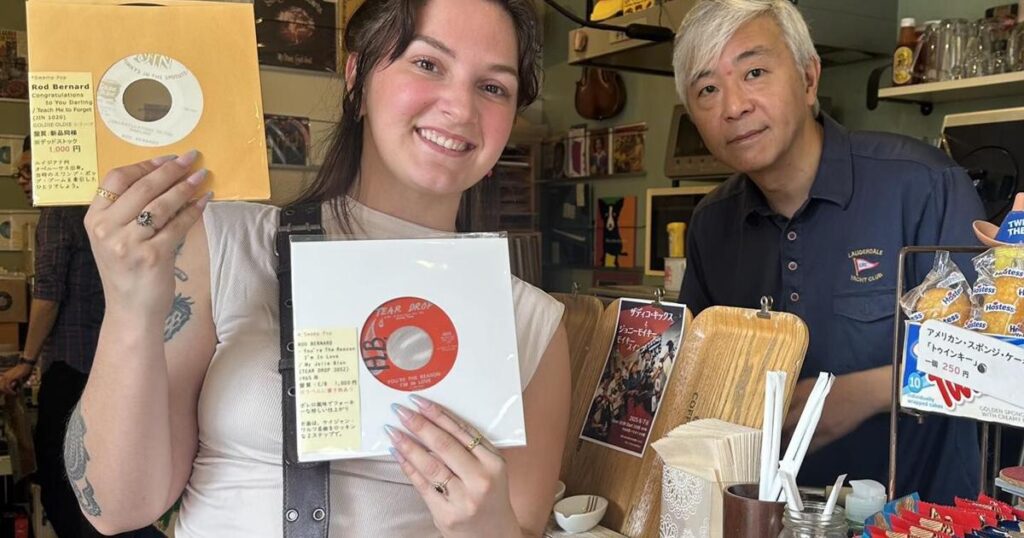During a trip to Japan this summer, Lafayette native Colette Bernard learned many things about the Japanese culture, including a world in the heart of Tokyo that seemed to parallel south Louisiana.
Bernard’s official tour guide was her dad’s friend, Kaz Kimuri, who took her to visit a few local spots in Tokyo. In the first 24 hours, she found herself at a local bar where band members of the Zydeco Kicks played washboards and accordions while singing zydeco tunes in Japanese all night long. Bernard was mesmerized by the band’s upbeat rhythms and soulful melodies.
Her next stop along the vibrant streets of Tokyo was a neighborhood cafe that featured all things Louisiana.
“It was like a crossover of two worlds,” Bernard said. “To hear Cajun music here and see them play was just breathtaking. Then, visiting this cafe after, I was kind of disoriented.”
Walking up to The Creole Coffee Stand in Tokyo, the first thing that caught Bernard’s eye was the Acadiana flag that hung alongside a welcome sign made out of pecan shells, a beloved ingredient in many Louisiana sweet treats. Inside the shop, Louisiana memorabilia hung on the walls and sounds of Clifton Chenier and Rod Bernard, her grandfather, were rotating on a record player. Bernard said she felt as if she was transported back to Lafayette.
Yoshitake Nakabayashi, who is also in a zydeco band, opened the Creole Coffee stand in December 2012, after losing his job due to a 2011 earthquake in Japan.
“I was at a loss as to what to do, so I thought to myself, ‘I’ll just make what I love into a job’ and opened a shop with the concept of coffee, music, vinyls, and Louisiana books,” Nakabayashi said.
Although encountering so much Louisiana in Japan was a surprise, Bernard said she grew up hearing about her father, Shane Bernard’s two friends — Kaz Kimura and Yoshi Nakabayashi.
The three men would bond over Cajun and Creole history and Shane’s dad, Rod Bernard, a well-known Opelousas swamp pop musician and broadcaster. Kimura’s relationship with Shane Bernard started nearly a decade ago when he sent him a letter to find out more about his father’s music. The two eventually became pen pals and shared cultural similarities, leading to Shane Bernard’s discovery of a community in Japan that enjoyed Louisiana culture.
Nakabayashi says he’s been in love with the culture and music since visiting Louisiana for the first time in 1997.
“I’ve always loved music and have been playing rhythm & blues on the piano since I was 20 years old. I started playing the accordion after visiting Louisiana, and that same year, Chris Ardoin came to Japan to perform,” Nakabayashi said.
In 2003, he visited Lafayette to attend a festival and learn more about the culture. He has an accordion made by Iota’s legendary instrument maker, Larry Miller. Years later, in 2019, Nakabayashi’s band performed for the first time at Festivals Acadiens et Creoles. Nakabayashi has continued to visit, performing at Festival International, and he continues to immerse himself in Cajun and Creole culture to better understand the music.
“I truly couldn’t believe that a Japanese person like me was able to play in this place that I had always dreamed of,” he said. “I’m still very grateful to the people of Lafayette for accepting me in the opportunity.”
In addition to the music, Nakabayashi said he loves the strong sense of tradition in south Louisiana, which he said is similar to Japanese culture. There are culinary similarities, too, as rice is the foundation of both Japanese and Louisiana cuisines. He describes Lafayette in particular as a city that perfectly blends nature, urbanity and a culinary destination.
Bernard said she appreciates the similarities in the cultures, especially the emphasis on family and preserving tradition.
“During my trip, I also got a chance to make Daruma dolls, and I experienced their work to preserve their own culture just how my dad does in Lafayette,” Bernard said.
Daurma dolls, which are traditional Japanese dolls used to make wishes, set goals and symbolize perseverance, are going extinct, she said. Kimaru took her to the set of his ethnographic film, organized by local government officials in Tokyo to teach locals about the dolls’ meaning, creation and history.
“I mean it takes a certain kind of person to care about a tradition, but there are people all over the world continuing to preserve their culture, and I think that’s what resonates between the two worlds,” said Bernard.

